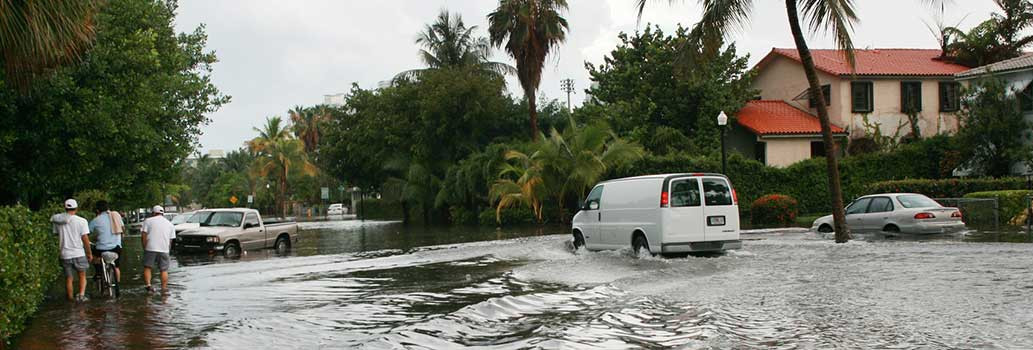Prepare for a Flood
Be prepared for flooding no matter where you live, but particularly if you are in a low-lying area or near water.
Know what to do before, during, and after a flood:
- Check out our flood zone map. It is crucial to know if you live in an area that is prone to flooding
- Sign up for Miami-Dade alerts. Receive emergency texts or emails regarding public safety issues, recommended public protective actions or other emergency information
Gearing up
- Turn on your TV/radio. You will receive the latest weather updates and emergency instructions
- Make a flood emergency plan for the relevant type of local flood risk with a plan for evacuation, shelter, high ground location or to move inland
- Create or restock your emergency preparedness kit. Have enough food and supplies to keep your family safe for at least 72 hours after a storm has passed. Your kit should include all the essential items your family will need, such as water, food, toiletries, flashlight, batteries, cash, medication, baby essentials and first aid supplies. Keep in mind your pet’s needs as well
- If you have a family member with medical needs that will need evacuation, remember to sign up for Miami-Dade County’s Emergency & Evacuation Assistance Program (EEAP)
Flood warning
- Listen to area radio and television stations and a NOAA Weather Radio for possible flood warnings and reports of flooding in progress
- Check with your local municipality to see if they will be distributing sandbags
- Be prepared to evacuate immediately if directed to do so
- If a flood or flash flood warning is issued for your area, head for higher ground or inland
- During a flood event, be sure to elevate household appliances, such as washers, dryers or other appliances that may get damaged by water. Store important documents in waterproof containers and check around the house to ensure drains and gutters are free of debris
- Stay away from floodwaters. If you come upon a flowing stream where water is above your ankles, stop, turn around and go another way. Six inches of swiftly moving water can sweep you off of your feet
- If you come upon a flooded road while driving, turn around and go another way. If you are caught on a flooded road and water rises rapidly around you, get out of the car quickly and move to higher ground. Six inches of fast-moving floodwater can knock over an adult. It takes just 12 inches of rushing water to carry away a small car and two feet of rushing water to carry away most vehicles
- Avoid walking or driving through flood waters. Water may be deeper than it appears, hiding all kinds of hazards that could hurt you or disable your car, such as debris, sharp objects, downed power lines and even dangerous wildlife
- Keep children and pets away from floodwaters
- Be aware of the risk of electrocution and stay away from downed power lines and electrical wires. Do not touch electrical equipment if it is wet or if you are standing in water. And never go on your roof when there is lightning
After a flood
- aReturn home only when officials have declared the area safe
- Never drive around barricades. They are there for your protection
- Before entering your home, look outside for loose power lines, damaged gas lines, foundation cracks or other damage
- Parts of your home may be collapsed or damaged. Approach entrances carefully
- Watch out for wild animals, especially poisonous snakes that may have come into your home with the floodwater
- If you smell natural or propane gas or hear a hissing noise, leave immediately and call the fire department
- Do not step in puddles or standing water if power lines are down outside your home. Report downed power lines by calling Florida Power and Light (FPL) at 1-800-4OUTAGE (1-800-468-8243)
- Many people may experience power outages after a flood or storm event. If you use a generator, be sure it is in good working condition and follow the manufacturer’s instructions.
- Never operate a generator inside your garage or near a window or door
- Keep children and pets away from floodwaters
- Ensure your food and water are safe before eating, drinking or washing
- Do not use water that could be contaminated
- Photograph damage to your property for insurance purposes
- Miami-Dade County residents whose homes or businesses have suffered flooding damage can report these damages via the Neighborhood Damage Assessment Entry Form or by calling 311 or 305-468-5900
Online Options
Report DamageResources
Flood Protection
Emergency Management
Pete Gomez
R. David Paulison Fire Rescue Headquarters
9300 NW 41st St,
Miami, FL 33178-2414
305-468-5400 | [email protected]
